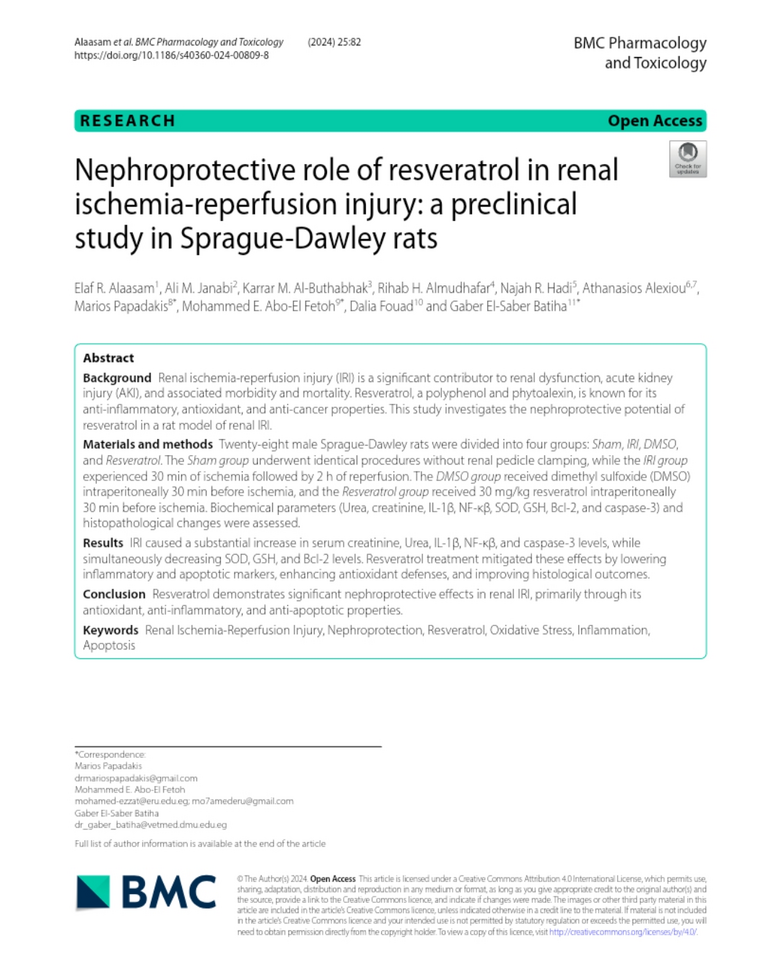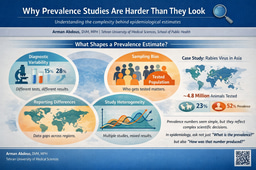Nephroprotective role of resveratrol in renal ischemia-reperfusion injury: a preclinical study in Sprague-Dawley rats
Published in Pharmacy & Pharmacology and Anatomy & Physiology

Explore the Research
Nephroprotective role of resveratrol in renal ischemia-reperfusion injury: a preclinical study in Sprague-Dawley rats | BMC Pharmacology and Toxicology
Excited to share my latest publication in BMC Pharmacology & Toxicology!
I'm thrilled to announce that our research article, "Nephroprotective role of resveratrol in renal ischemia-reperfusion injury: a preclinical study in Sprague-Dawley rats," has been published in BMC Pharmacology & Toxicology.
In this study, we investigated the potential of resveratrol, a natural compound found in grapes and red wine, to protect kidneys from damage caused by ischemia-reperfusion injury (IRI). IRI occurs when blood flow to the kidneys is interrupted and restored, often leading to inflammation and oxidative stress.
Our findings suggest that resveratrol may be a promising therapeutic option for preventing or treating renal IRI. By reducing inflammation, oxidative stress, and apoptosis (cell death), resveratrol helped preserve kidney function in our rat model.
https://rdcu.be/d1TBm
#nephrology #kidneyhealth #resveratrol #antioxidants #pharmacology #toxicology #research
Follow the Topic
-
BMC Pharmacology and Toxicology

BMC Pharmacology and Toxicology is an open access, peer-reviewed journal that considers articles on all aspects of chemically defined therapeutic and toxic agents. The journal welcomes submissions from all fields of experimental and clinical pharmacology including clinical trials and toxicology.
Related Collections
With Collections, you can get published faster and increase your visibility.
Small molecule therapy
BMC Pharmacology and Toxicology is calling for submissions for the Collection on Small molecule therapy.
Small molecule therapy encompasses a diverse range of pharmacological agents designed to modulate biological processes at the molecular level. These compounds have revolutionized the treatment landscape for various diseases, including cancer, cardiovascular disorders, and neurodegenerative conditions. The ongoing exploration of small molecules, their mechanisms of action, and their interactions with cellular pathways has opened new avenues for therapeutic development. This Collection aims to highlight recent advancements and innovative strategies in small molecule therapy, focusing on the design, synthesis, and application of these agents to treat various diseases.
The development of highly specific small molecule therapeutic compounds has improved treatment efficacy while minimizing toxicity, and recent breakthroughs in drug delivery systems and formulation techniques have enabled targeted therapies that maximize therapeutic benefit while reducing side effects. Additionally, advances in computational methods, including machine learning and AI-guided drug design, when accompanied by real-world validation of molecular targets, are a promising avenue of research in this field.
To showcase advances in the development of small molecule therapies, topics for this collection include but are not limited to:
Target specificity in small molecule design
Assessment of pre-clinical and clinical toxicity and long-term effects
Drug-drug interactions in small molecule therapy
Innovations in drug delivery and formulation
Computational and AI-guided small molecule drug design
Validation of in silico studies with in vitro and in vivo data
All manuscripts submitted to this journal, including those submitted to collections and special issues, are assessed in line with our editorial policies and the journal’s peer review process. Reviewers and editors are required to declare competing interests and can be excluded from the peer review process if a competing interest exists.
Publishing Model: Open Access
Deadline: Jul 13, 2026
Nanomedicine
BMC Pharmacology and Toxicology is calling for submissions to our Collection on Nanomedicine.
Nanomedicine has emerged as a transformative field at the intersection of nanotechnology and medicine, highlighting in diagnosis, treatment, and prevention of diseases. The nanomedicine utilizes human-generated materials and devices that are thousands of times smaller than the diameter of a human hair and can work with human body at the atomic or molecular level to improve target specific and overall efficacy but limiting side effect of drugs compared to traditional therapies. This therapeutic strategy has opened new avenues for treating complex diseases, including cancers, neurological disorders, and infectious diseases, marking a pivotal shift in personalized medicine and therapeutic interventions.
As research in nanomedicine continues to expand, we can anticipate groundbreaking advancements that will further refine drug delivery systems and enhance therapeutic outcomes. Future innovations may include the development of smart nanocarriers capable of responding to specific biological stimuli, thereby improving the precision of drug release. Moreover, ongoing studies may lead to more comprehensive assessments of the long-term safety and efficacy of nanomedicines, ultimately contributing to a more robust understanding of their role in modern healthcare.
Our Collection welcomes research articles focusing on, but not limited to, the following aspects:
Advances and potential medical application of nanotechnology
Evaluation and prediction of adverse reaction and efficacy of nanotechnology in therapeutic treatment
Development and improvement of nanotechnology-based drug delivery or efficacy system
Nanomedicine in gene therapy
Innovative diagnosis and implanted nanodevices and their clinical application
This Collection supports and amplifies research related to SDG 3: Good Health and Well-Being.
All manuscripts submitted to this journal, including those submitted to collections and special issues, are assessed in line with our editorial policies and the journal’s peer review process. Reviewers and editors are required to declare competing interests and can be excluded from the peer review process if a competing interest exists.
Publishing Model: Open Access
Deadline: Mar 19, 2026




Please sign in or register for FREE
If you are a registered user on Research Communities by Springer Nature, please sign in